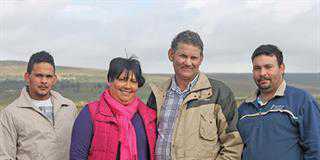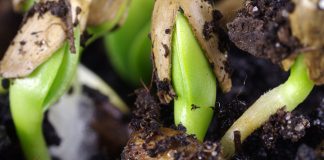The processing of fibre and derivatives from kenaf is about to commence in Winterton, KwaZulu-Natal, in a brand new plant presently undergoing commissioning, with production set to kick off in early April. Clifford van Niekerk, general manager of Brits Automotive Systems and of Sustainable Fibre Solutions (SFS), and Dale van den Aardweg, agricultural consultant for SFS, tell Peter Hittersay about the project.
Readers may recollect the ARTICLE THAT APPEARED in Farmer’s Weekly of 19 August 2005 identifying the characteristics, production and uses of the fibre-producing kenaf (Hibiscus cannabinus L) herbaceous annual plant, and describing the five-year research and trial period that culminated in selected Winterton farmers being contracted to grow kenaf to determine the potential for commercial production.
This potential being successfully shown, a joint-venture company, Sustainable Fibre Solutions (SFS), was formed to cultivate, process and produce end-products from kenaf fibre. article bring readers up to date with developments since then, and what the future holds for the agricultural and economic development of the area and its people.
The processing plant
Cresting the hill as one approaches Winterton from Bergville, you are immediately struck by the massive gleaming structure of SFS’s kenaf decorticating plant, erected on a 45ha site just outside this small rural town. Turning the first sod in May 2006, has erected a 4 500m² processing plant, a 3 900m² warehouse and a 2 700m² one-month enclosed kenaf bale-storage shed. The shed is to ensure that sufficient dry bales for one month’s processing are available at all times, should a prolonged period of inclement weather be experienced. “This Phase 1 project involves a total investment of some R80 million by the joint-venture partners, the Industrial Development Corporation and SFS’s holding company, Seardel Investment Corporation, to enable it to process 25 000 tons per annum, operating on a 24/7, 49-week per annum basis – making it the largest plant of its kind in the world. It will provide 50 direct job opportunities at the plant with many more being created in the private sector, if you use the multiplier effect, and more temporary seasonal worker job opportunities in the planned 2 200ha to 3 000ha contracted-farmer sector,” explains Clifford van Niekerk, general manager of SFS. “While provision has been made within the existing facilities to increase capacity by 50% under Phase 2, it will require additional investment when it is implemented. As the project progresses, steps will be taken to comply with the AgriBEE charter.
In addition, consideration is to be given to offering a consortium of contracted kenaf producer farmers an opportunity to become shareholders.” he dry-processing machinery installed and presently undergoing precommissioning trials was sourced from leading German and Belgium manufacturers. Their technicians have been supervising the installation, and together with SFS personnel conducted processing trials which revealed that the trial fibres and pith produced were of a very good quality. While the uses of kenaf include pulp and cellulose, particle board, textiles, injection moulding, biofuel, high-quality animal bedding, oil absorption, biomedication, filtration, potting media and animal feed, SFS will primarily be producing the fibre for the domestic and export markets.
Seardel Investment Corporation’s Brits Automotive factory in Pinetown will use kenaf to reinforce items such as car headliners, door panels, boot trims, wheel arches and parcel shelves from these recyclable fibres (bio-composites) for local vehicle manufacturers to comply with Article 7 of the EU directive on environmental legislation relating to the re-use and recovery of all motor vehicles. The same requirements apply to the export market. Brits Textiles is already manufacturing a selected number of these vehicle components for BMW, Toyota and Nissan, sourcing manually processed fibres imported from Bangladesh. Clifford adds, “Commissioning of the plant is expected to be completed by the third week of March, when we start with our final set-up, so that by the first week of April we can commence initial production on a 12/5 basis before going into full 24/5 production, and then on to 24/7 production for Phase 2.”
Contracted farmers
The commercial farmers in the Winterton-Bergville area of KwaZulu-Natal are always looking for new cost-effective and soil-beneficial methods of growing crops.
It was largely this spirit of willingness to participate in the trials to establish kenaf’s potential as a viable commercial crop, led by SFS’s agricultural consultant Dale van den Aardweg, which motivated SFS to site the plant in Winterton. Clifford says, “Initially we will enter into annual contracts with farmers in the Winterton-Bergville area to grow kenaf to build up confidence that this is a profitable alternative crop that fits in with rotations of soya, maize, wheat and sorghum, as it also has a deep tap root system that aids infiltration. “Once we have achieved this, we intend entering into long-term contracts of possibly five years with a core group of farmers capable of planting 2 200ha to 3 000ha annually to ensure continuity of supply to meet our Phase 1 requirements, and more when we go to Phase 2. Yields were achieved of 17t/ha under irrigation in the 2003/04 season, but as many of the farmers in the area planted dryland, the average was 15,12t/ha,” explains Clifford. “However, working closely with universities of the Free State and Pretoria, which are on board to conduct ongoing research and provide advisory services through Dale van den Aardweg to contracted farmers, we intend assisting these farmers to increase yields.
Yields and prices at the current level make this an attractive alternative crop, and as we plan to meet with the contracted farmers each year, approximately three months prior to planting, they will be party to the price-determining mechanism, bearing in mind the benchmark set by the world fibre price.” Kenaf seed is imported from a Mexican seed producer and will be provided to the contracted farmers for their account. The farmer will plant and husband the crop until ready for harvesting, with the assistance of SFS’s advisory services and guidance from the universities of the Free State and Pretoria. SFS will then, at their cost, have the crop cut and laid into neat windows by a contractor using specially modified Claas Jaguar forage harvesters, retted and dried using customised hay-making equipment, baled and transported to the plant, where the individual farmer’s bales will be weighed and stacked in an allocated area. This will ensure that farmers get paid according to the quality of their kenaf fibre, once sufficient data are accumulated to develop a quality formula. During the harvesting season more temporary employment opportunities will be created, as workers will be required as gleaners to collect kenaf stems not picked up during the baling operations.
Crop husbandry will also require temporary workers to manually remove weeds such as morning glory. “Farmers from as far away as Newcastle have expressed interest in producing kenaf, and if SFS is unable to contract enough farmers in the Winterton-Bergville area, it may consider contracting from further afield. I have been working closely with the KwaZulu-Natal Department of Agriculture and the Agricultural Research Council canvassing a small-scale farmer community in the Okhomshalama area to establish if they would like to grow kenaf,” says Dale. “Working with government extension officers, we now have about 35 small-scale farmers on board, many of whom have planted 1ha to 5ha plots which are looking very good. We are also working with the Okhomshalama local municipality, which covers the Bergville-Winterton area, which is pleased to learn of the erection of the plant and keen to have their small-scale growers produce kenaf. In that area it’s becoming a community-based initiative with both small-scale and commercial farmers involved.” • For more information contact Clifford van Niekerk on (031) 709 1168, e-mail cliffordn@ brits.co.za or Dale van den Aardweg on (036) 488 1371, e-mail [email protected]. |fw













